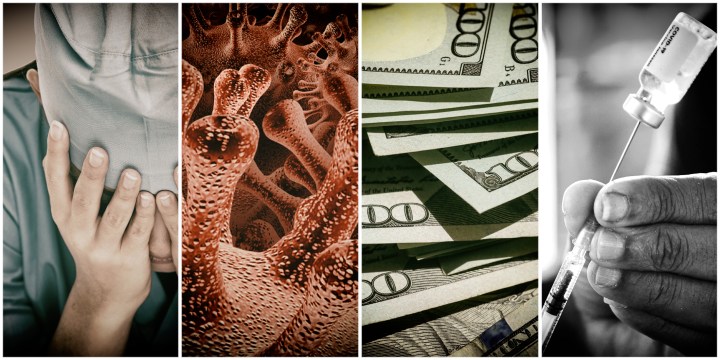AMNESTY INTERNATIONAL OP-ED
How pharmaceutical companies denied Africa a fair shot at vaccination

Pharmaceutical companies must prioritise delivery to low-income countries in order to meet the WHO’s target of 70% global vaccination before mid-2022. Investors into these pharmaceutical companies have to step up to the mark too.
It is just over two years since South Africa recorded its first Covid-19-related death, and we have not yet beaten the virus. Although restrictions are easing, just 30% of the population is vaccinated — and the numbers are far lower in other African countries.
To date, less than 15% of people in Africa have been fully vaccinated against Covid-19. Countries in East Africa and the Great Lakes have some of the lowest rates in world, with less than 1% fully vaccinated in Burundi and the Democratic Republic of the Congo. Vaccination distribution continues to be painfully slow across the continent, igniting fears of deepening poverty and a prolonged economic recovery.
Amnesty International’s annual report, released earlier this week, highlights vaccine inequality as emblematic of a year defined by corporate greed and national selfishness. Wealthy governments and business leaders have failed to rise to the challenge of a once-in-a-century global health and human rights crisis. Covid-19 should have been a wake-up call to deal with inequality and poverty. Instead, we have seen deeper inequality and greater instability in Africa exacerbated by global powers, especially rich countries, who failed to ensure that big pharma distributed vaccines equally between states.
Ten billion Covid-19 vaccine doses were produced last year, more than enough to reach the 40% global vaccination target set by the World Health Organization (WHO). Yet just over 4% of those living in low-income countries had been fully vaccinated by the end of last year.
More than 1.2 billion people in low and lower-middle-income countries could have been vaccinated by the end of 2021 if high-income countries and vaccine makers took their human rights obligations seriously. Instead, rich governments chose to increase stockpiles and pharmaceutical companies focused on profits.
One problem is that supplies to the Covax facility and the Africa Vaccine Acquisition Trust have been insufficient, as have bilateral donations. Other doses have been handed over at short notice, making it hard for governments to build effective roll-out campaigns, let alone build trust among populations.
Last year, for example, Nigeria destroyed more than 10 million doses that it had received just weeks before expiry. Malawi, DRC and South Sudan, which have some of the lowest vaccination rates in the world, had to do the same. The South African Department of Health’s announcement that it is throwing away 90,000 expired Pfizer doses today is, sadly, the tip of the iceberg when it comes to vaccine waste.
Meanwhile, some of the world’s richest countries have vociferously blocked proposals to temporarily suspend intellectual property rights. They have sat on stockpiles of vaccines, dumping millions of hoarded doses that could have saved lives. Many European countries have vociferously blocked proposals to temporarily suspend intellectual property rights.
Vaccine makers have shamelessly prioritised profit over people, monopolising technology, blocking and lobbying against the sharing of intellectual property, charging high prices for vaccines and prioritising supplies to wealthy countries. Amnesty International’s report, Money Calls the Shots, highlights how, in 2021, Pfizer, BioNTech and Moderna projected joint revenues of up to $54-billion yet supplied less than 2% of their vaccines to low-income countries. Chinese companies Sinovac and Sinopharm delivered just 0.5% and 1.5% respectively of their vaccines to low-income countries.
Johnson & Johnson’s and AstraZeneca’s records on distribution were better — with 50% of their stock reaching low and lower-middle-income countries (with many of these doses provided as “donations” from upper-income countries, not as part of sales agreements).
However, both companies still refuse to share their technology and intellectual property through WHO-coordinated initiatives.
Despite billions in public funding, and after more than 5.6 million deaths globally from Covid-19, pharmaceutical companies are continuing to put their own greed before their human rights responsibilities. The result is that poorer countries are struggling to return to any kind of normality. 23 low and middle-income countries still have full or partial school closures, affecting hundreds of millions of children. How many more variants do we have to live through before high-income countries and pharmaceutical companies realise that no one is safe until everyone is safe?
If we want 2022 to be the last year of this pandemic, we have to shift course now.
Pharmaceutical companies must prioritise delivery to low-income countries in order to meet the WHO’s target of 70% global vaccination before mid-2022.
The investors into these pharmaceutical companies have to step up to the mark too. While Covid-19 unleashed unimaginable suffering on millions around the world, they thrived. It’s time for investors to face up to their actions and use their considerable leverage to pressure pharmaceutical companies to lift obstacles to fair vaccine access, as well as promote accountability and transparency.
Everyone deserves a fair shot at a vaccine. As we enter our third year of the pandemic, it’s time that everyone, everywhere in this world, has immediate access. DM/MC
Rajat Khosla is Amnesty International’s Senior Director of Research, Advocacy and Policy.
"Information pertaining to Covid-19, vaccines, how to control the spread of the virus and potential treatments is ever-changing. Under the South African Disaster Management Act Regulation 11(5)(c) it is prohibited to publish information through any medium with the intention to deceive people on government measures to address COVID-19. We are therefore disabling the comment section on this article in order to protect both the commenting member and ourselves from potential liability. Should you have additional information that you think we should know, please email [email protected]"



 Become an Insider
Become an Insider